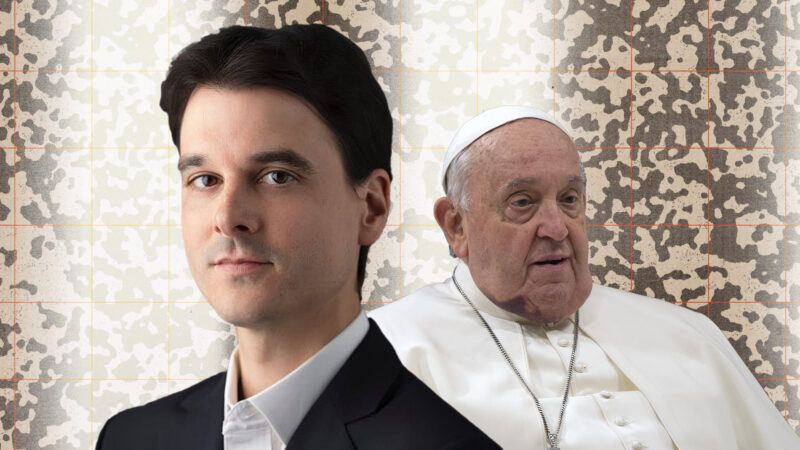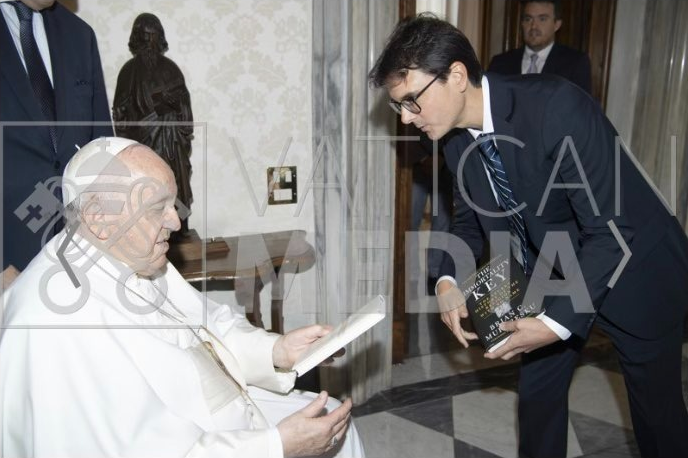The Day the Pope Met a Psychedelic Evangelist
Pharmacological Perennialism crossed paths with the Catholic Church at a previously unreported "holy meeting."

The pope met an emissary from the psychedelic world at a "holy meeting" at the Vatican, where a Jesuit lawyer named Brian Muraresku presented Pope Francis with a manifesto for a psychedelic "New Reformation."
Popes and reformations do not historically get along, but Francis accepted a copy of Muraresku's 2020 book The Immortality Key at the meeting, which took place in late 2021 or early 2022. The book argues that psychedelics might rescue a "dying faith" and save Western civilization.

Though the science journalist Michael Pollan has called it "groundbreaking," The Immortality Key is largely a rehash of others' work shaped into a dubious Da Vinci Code–style thriller. Trade publishers would otherwise have little interest in a 400-page goose chase for what intoxicants the oracles and prophets might have been smoking or sipping, and so the book begins with a message for today. Western civilization, Muraresku argues, is in the grip of a cataclysmic "spiritual crisis" that can be remedied only through a "popular outbreak of mysticism," the result of retrieving what he says are the Eucharist's ancient, and until now secret, pharmacological roots.
And what are those roots? Muraresku is convinced that Christianity evolved from pagan mystery cults whose most sacred ritual involved the ingestion of a psychedelic fungus—and that this sacrament, the kykeon, eventually became the Holy Eucharist.
A protégé of Graham Hancock (an Economist reporter turned conspiracy theorist who has made a fortune writing speculative bestsellers about purported lost civilizations), Muraresku has written that "about seventy-five percent would leave the FDA-approved house church permanently transformed. And ready to begin a lifelong spiritual journey that could, once again, make life livable on this planet. This should begin happening by 2030, if not sooner."
Unsurprisingly, The Immortality Key has been surrounded by controversy. Critics have already assailed it as a work of scholarship. Many people depicted in the book have started speaking out against it too; I explore their criticisms in a story to be published in the issue of Reason that will hit newsstands in January. (Subscribe now to read it when it comes out.)
Muraresku became part of the inner circle of psychedelic researchers at Johns Hopkins University after penning a book arguing their research into mystical experience was the key to unlocking Christianity's "secret history." Muraresku also suggests the New Testament—"outdated and impenetrable," in his words—might in the future be replaced by the "sacred technology" of psychedelics.
This group—also to be covered in greater depth in that issue of Reason—has attracted a lot of recent criticism as well, including a bombshell exposé in The New York Times. One common critique accuses the late psychopharmacologist Roland Griffiths of infusing his research with his own spiritual beliefs, including the idea that there is one truth and one universal core to all religions. That notion is at the heart of Perennialism, a school of mysticism with a long history.
While it's not clear whether Pope Francis has actually read Muraresku's book, the Vatican did recently host a psychedelic conference. And in September, for what it's worth, a controversy broke out when Francis expressed an idea akin to Perennialism: "Every religion," he said, "is a way to arrive at God."
For more on the connection between faith and psychedelics, read "The Most Controversial Paper in the History of Psychedelic Research May Never See the Light of Day" and "The Strange Case of The Immortality Key," published in Reason's March 2025 issue.
Editor's Note: As of February 29, 2024, commenting privileges on reason.com posts are limited to Reason Plus subscribers. Past commenters are grandfathered in for a temporary period. Subscribe here to preserve your ability to comment. Your Reason Plus subscription also gives you an ad-free version of reason.com, along with full access to the digital edition and archives of Reason magazine. We request that comments be civil and on-topic. We do not moderate or assume any responsibility for comments, which are owned by the readers who post them. Comments do not represent the views of reason.com or Reason Foundation. We reserve the right to delete any comment and ban commenters for any reason at any time. Comments may only be edited within 5 minutes of posting. Report abuses.
Please to post comments


"Oh yeah? Is the Pope Catholic?"
Later, in 2024 : "a controversy broke out when Francis expressed an idea akin to Perennialism: "Every religion," he said, "is a way to arrive at God."
Meanwhile, Jesus: "John 14:6
Jesus answered, “I am the way and the truth and the life. No one comes to the Father except through me."
The only consolation prize of this is that Pope wheelchair will be dead soon.
Jesus will have something to say to him then.
a controversy broke out when Francis expressed an idea akin to Perennialism: "Every religion," he said, "is a way to arrive at God."
I'm an atheist and I can't figure out what's controversial about this.
Does the Pope shit in the woods?
It's like a Coca Cola executive saying Pepsi is just as good.
From the view of the Catholic Church itself, that is like the Surgeon General saying that Mesmerism, Faith Healing, Aromatherapy and Acupuncture are also legitimate cancer treatments.
A 1935 movie abt the Crusades had Saladin and some other actor eructating about how the christian and mohammedan deities were the same thing. (https://www.youtube.com/watch?v=w9-_LTXKfd8) But let a libertarian notice that equivalence of the looter kleptocracy factions and goodness... how the howling becomes a keening wail.
If you don't understand what you're babbling about, you probably shouldn't do it, Old Balls.
So you gotta be stoned to pick up what they're layin' down?
The pope recently blessed a nativity scene where baby Jesus was wearing a keffiyeh.
So I'm pretty sure the Pope is not Catholic. And while it was not based on mystery cults, the Catholic Church did absorb a lot of rituals and stupidity from Roman state religions.
The other thing, as Reason has actually covered years and years ago, we actually have a modern "prophet". Philip K Dick. He had a religious experience and spent much of life trying to cope with it, writing things down (which was published as the Exegesis of Philip K Dick which you guys reviewed, though he also wrote a fictionalized version in h is novel Valis) . While a drug user, he was not on them when it happened.
While the more likely answer was he had some sort of psychotic episode than brush with the divine (though as a side effect, he was able to diagnose a problem with one of his children, which saved his life, though no faith healing or anythng like that, he went to the hospital) it does show that religious experiences can happen without drugs
What a joke of a woke Pope. He should resign like his predecessor.
"Muraresku is convinced that Christianity evolved from pagan mystery cults whose most sacred ritual involved the ingestion of a psychedelic fungus—and that this sacrament, the kykeon, eventually became the Holy Eucharist."
Isn't that teaching technically blasphemous?
But it can't be so, because the guy is a Jesuit and wasn't excommunicated by the Church. /sarc
I'd rather see the pederast of Rome taking advice from this kid than Mussolini.
Muraresku is convinced that Christianity evolved from pagan mystery cults whose most sacred ritual involved the ingestion of a psychedelic fungus—and that this sacrament, the kykeon, eventually became the Holy Eucharist.
So, he's in no way Christian and openly hostile to Christian beliefs/teachings. OK.
Weird that the Pope would entertain such a thing, but kind of a blip on the Pope's weirdness meter. I know he's the Vicar of Christ, but he's still a flawed and fallen man, and sometimes that happens with popes.
Unsurprisingly, The Immortality Key has been surrounded by controversy.
Well, yea. It's pretty obviously a cult manifesto.
And in September, for what it's worth, a controversy broke out when Francis expressed an idea akin to Perennialism: "Every religion," he said, "is a way to arrive at God."
So long as you're in genuine pursuit. In which case you'll inevitably see those religions' flaws/corruption and ultimately reject them in favor of Catholicism. People quoting the Pope on that subject like to omit that part.
I don't know. I'm not Catholic, at all, but I might be a better Catholic than the pope.
Wouldn't be the first time in history that happened.
It's why Catholics don't blindly follow him. Sometimes I personally wonder if poor clergy are intentionally put into place as a reminder of the importance of critical and independent thinking in the life of every Catholic, while still remaining faithful to Him and His Church. It's why I always find it so odd how many libertarians are anti-Catholic. Catholicism demands the highest reverence towards Truth, Reason, Rationality, Goodness, Beauty, and Reality. Because God IS all of those things - all of which are ultimately reflected in one's Faith.
God and Christ Jesus never demanded mindless automatons. He promised salvation to those who would seek and know Him. That includes questioning, especially when we suspected we were being misled.
In case you've never seen and/or contemplated them, Raphael's masterpiece at the Vatican Museum are (NOT "is") the single greatest illustration of a human truly understanding this. IMCO.
This is, incidentally, where I think Luther and the Protestants went off the rails as - fast forward - all its splinter denominations now treat the Word of God as something to be conveniently "interpreted" with social/political/cultural thoughts in mind. Their blinding anger at Pope Leo, leading to his flat out rejection, separated them from Christ - ultimately deluding them into believing that they could define their own Christianity as a "personal relationship" with Him that is borne mostly of their own egos and wouldn't require His guidance outside of recorded scripture.